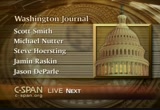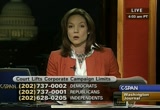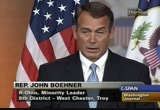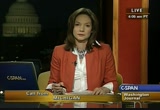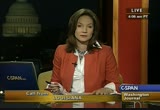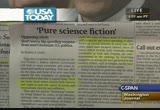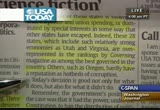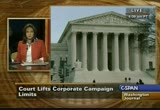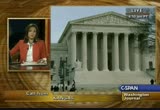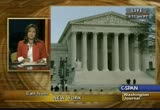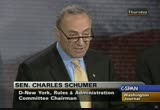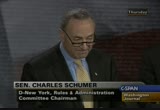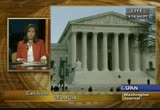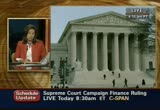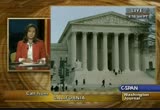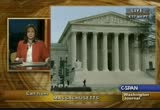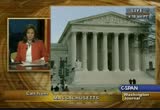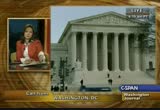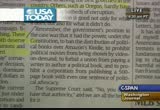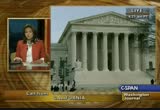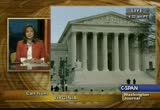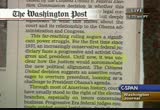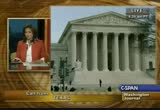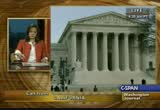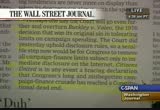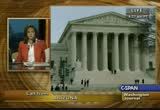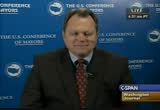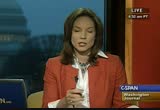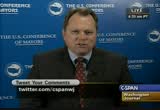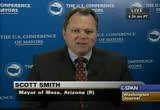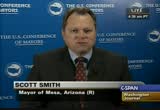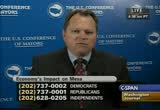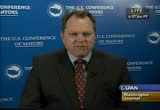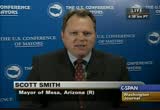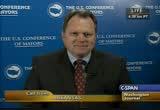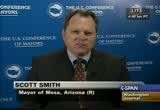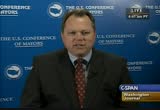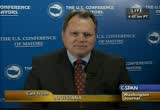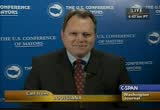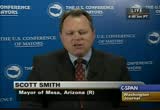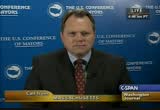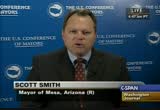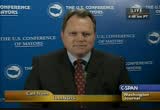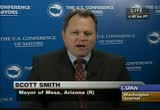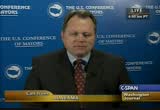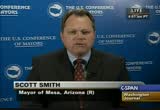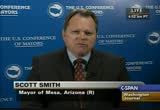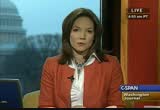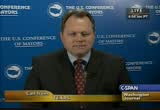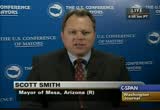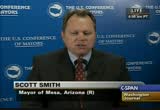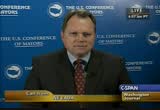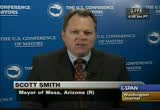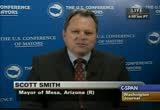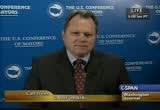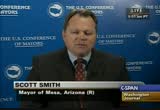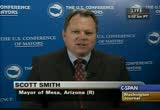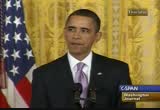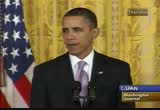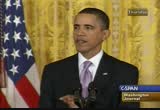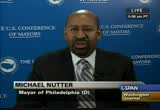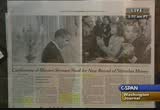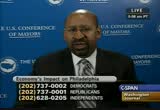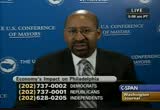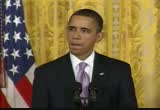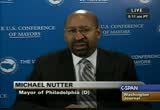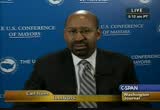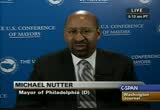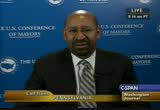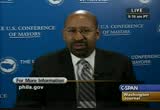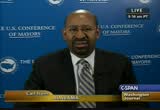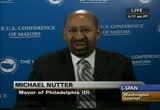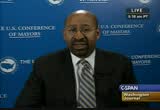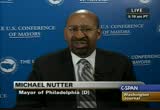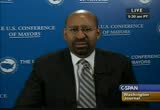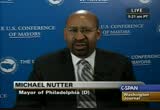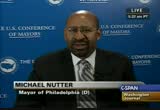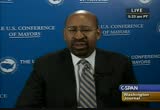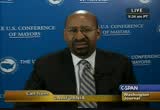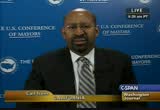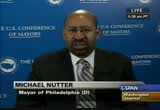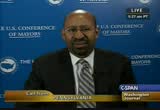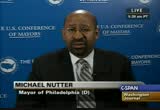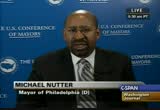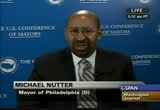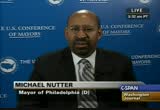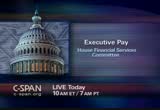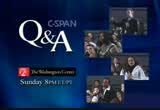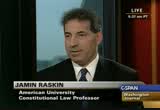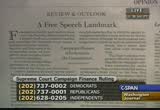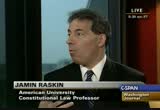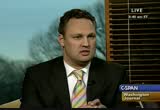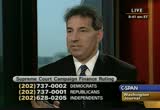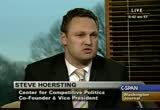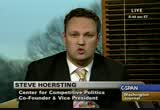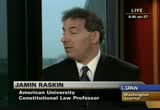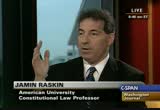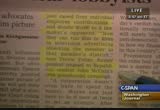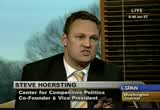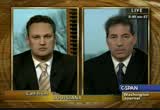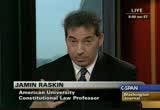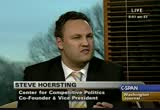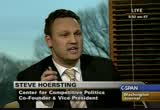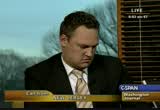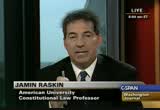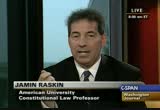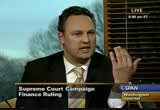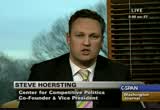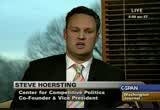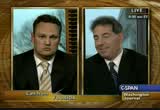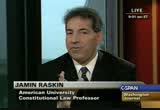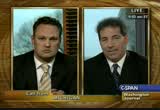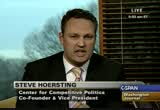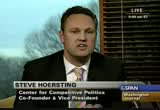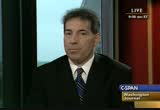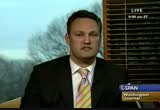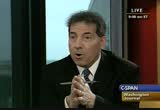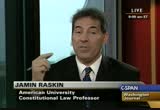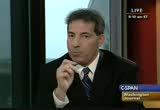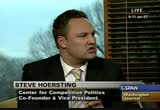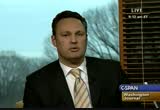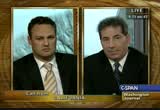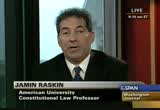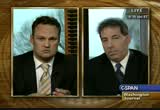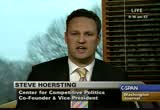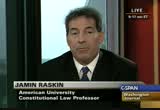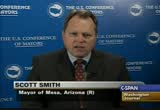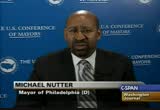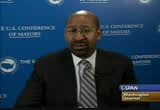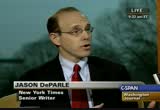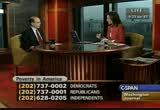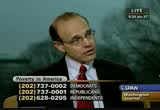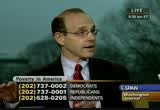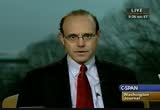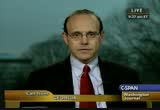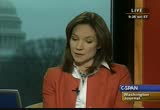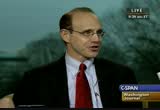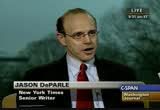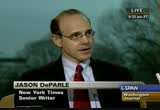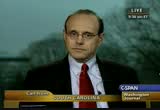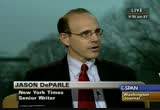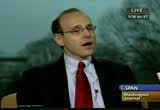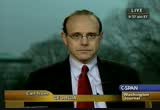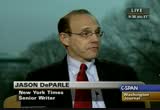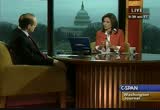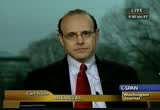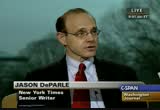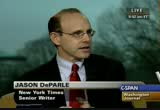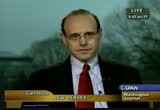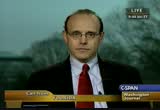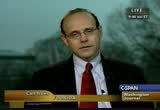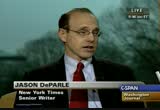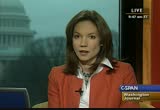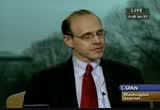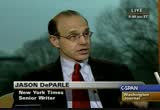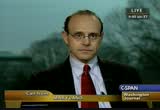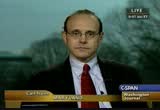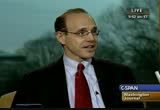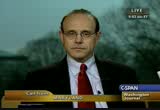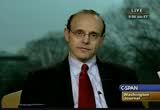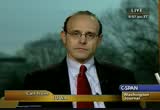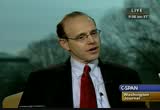tv Washington Journal CSPAN January 22, 2010 7:00am-10:00am EST
7:00 am
and we will talk to jason deparle about poverty in america and the economy. from the nation's capital, this is " washington journal." host: the supreme court ruled 5- 4 to allow corporations to spend as much as the want to support or oppose individual candidates. the ruling is likely to also allow labor unions to send unlimited funds. the justices kept in place, though, a century old ban on corporate donations directly to any one candidate. let us kickoff today's " washington journal" talking about the supreme court decision. the phone lines --
7:01 am
send us a tweet at c-spanwj or e-mail us at journal@c-span.org. "the washington post" on this story. the court also overturned a ban on corporations and unions airing campaign ads in the 30 days before primary and 60 days before a general election. also in "the washington post" this morning they talk about the reaction on capitol hill. inside "the washington post" its quotes senator charles schumer -- bound to push for new restrictions on corporate political spending, including limits for companies with government contracts, shareholder approval of expenditures and a proposal to make cheap executives appear in ads approving the content. also pushing legislation to match small donations with
7:02 am
public financing. the ruling can be found on our website c-span.org. if you go there you can find the oral arguments as well as the ruling and reaction from the white house and other folks on our website, c-span.org. of the first phone call on court lifting campaign limits. indianapolis, indiana. good morning. caller: good morning. host: what do you think? well caller: thing conveniently left out of the conversation from senators and congressman was the comparison it gives political action committees. they are the ones to start a political action committees some time ago. why can't the corporation just make itself a political action committee? host: corporations can still have their pac -- that was not talked about in the ruling. caller: why are they so up in arms when they can hide money in a political action committee? host: i see what you're saying, ok.
7:03 am
caller: it is all about the money. what is to stop greenpeace from the and the same thing? it is not just big disney. this has been an issue for a long time. it needs to be aired. we need to do something about it but it is not just big business. it is anybody who wants to call themselves a political action committee and it was congress to start it that and now it has come full circle and they are screaming about it. it is ridiculous. host: connecticut, edward, good morning. are you calling on the democratic line? is that correct. caller: correct, ma'am. yes, i am calling -- good morning. host: good morning, sir. in a what, at work, you need to turn the phone down -- a reminder to everybody is to turn the television down, excuse me, or else you will have a hard time hearing me. we will return to your phone call in a minute. reaction at capitol hill.
7:04 am
we will begin with the minority leader in the house, john boehner. here is what he had to say. >> i think the supreme court decisions today are a big win for the first amendment and a step in the right direction. i have always believed that sunshine was the best disinfectant. when you look at our campaign finance system and what happened under mccain fine gold -- feingold we put money out of the light into the dark. the money was still being spent but no one could see where it was coming from. i think what they do in virginia is the most sensible way to have a real campaign finance reform. have no limits, but allow every dime spent on behalf of a candidate or issue to be published so that the american people have a clear view of who is supporting which candidate or who is opposing which candidate.
7:05 am
let the american people decide how much money is enough. sunshine really does work if you allow it to. host: the white house yesterday also issued a response. here is what the white house said -- but the ruling the supreme court has given a green light to new stampede of special adjustment in our politics. a major victory for big oil, wall street banks, health insurance companies and other powerful interests that marshaled our everyday -- host: george on the republican line caller: are you there? host: i've yes. caller: politician should put term limits on these things. if they want to put restrictions on campaign things, why don't
7:06 am
they put restrictions on how many years they can run? i can see them having office for 12 years. if you can't get nothing done in 12 years, you are worth less. host: houston, texas, on the independent line. go ahead. caller: i am concerned -- corporate lobbyists are now going to be controlling washington and all of the action going on and the administration will be hampered with this. at the same time, inquiries about the war in iraq and i'm wondering why they are not having inquiries in america with a financial oversight -- no accountability and the poor are going to be the ones left out. appreciate it. host: shreveport, louisiana, on the republican line. caller: good morning.
7:07 am
i'm absolutely baffled and at a loss to understand this. i need an explanation of what the supreme court was thinking on this. this is just an absolute sell out to special interest groups in america. the american people are absolutely going to lose their voice. they are going to be swamped by the money that is going to flow in. i have been upset for years about the politicians pandering to special interest groups. is this the republican party position that this is a good thing? how could this be good for our country? host: let me read something from " usa" -- "usa today" agreeing -- the opposing view agreeing with the decision. bradley smith -- he says there
7:08 am
7:09 am
what do you think? caller: i think that the political analysts are so out of touch for anybody to suggest that our politicians are not motivated by special interest groups. nursing, fire, teachers associations, unions. it is a ridiculous position and where are we at that political analysts are spewing that garbage. there is nobody on either side, democrat or republican, that the leaves special interest groups are not controlling and pulling strings. politicians are pandering daily to special interest groups. i don't mean to knock obama's
7:10 am
administration, but there is not a platform that he has that is not controlled by special interest groups. host: below the fold of "the new york times." democrat line, don. caller: i believe this recent ruling by the supreme court has been a major setback in our achieving true campaign finance reform. a victory for the very wealthy corporations over ordinary folks. they claim this is an issue of freedom of speech but it is, again, another takeover. money rolls politics, as we know. once again, the supreme court has imposed its will upon us. we need it true campaign finance reform in this country.
7:11 am
the only way we are going to get things right, and it appears that a lot of folks -- not ordinary folks, but a lot of ordinary folks to not want this to occur. this is about freedom of speech -- if this is about freedom of speech, then why in the and will only those with big money to be heard? host: what about unions? unions will also be able to spend as much as they want to impact candidate races. caller: absolutely. i join -- totally disagree but that, too. we need to go to a system sort of like what they have in great britain or canada where we use government money and it will be fair and equal and a level playing field for any and all candidates. host: andover, new york, on the republican line. caller: a very interesting conversation we are having.
7:12 am
i would like to make a suggestion. rather than get all upset about the corporations and unions and everybody else donating money, why not put in contacts on all donations above, say, $100. that would allow the rank and file, if you will, the people, to donate money to their representatives of and anything above $100, we will take 20% of that for the government to cut our national debt. host: all right. chuck schumer, democrat from new york, also reacted to yesterday's ruling. here is what he had today. >> today's ruling, decided by the slimmest of majorities, but our system of free and fair elections.
7:13 am
-- guts our system. the bottom line is this -- the supreme court just predetermined the winners of next november's elections. it won't be republican, it won't be democrats, it will be corporate america. as chairman of the senate rules committee, the committee with jurisdiction over these issues, i am announcing we will hold hearings on the impact of these decisions in the next couple of weeks. we will explore what potential legislation can mitigate what severe damage this decision can have on our democracy. chris and i are committed to pursuing legislation that will be implement the ban on corporate spending, or at the very least, modify it in a significant way. we cannot, we will not, allow for corporations both to unduly influence elections and cast a shadow of corruption on our system of government. it is an imperative if you believe in this democracy to act
7:14 am
and act now, and we will. host: we are talking about the court lifting corporate campaign limits. here is a tweet from one of our viewers, you can tweet us on c- spanwj. georgette, pat on the independent line. your thoughts. -- georgia, pat on the independent mind. caller: have downloaded the decision but i have not had a chance to read it. actually i read on the internet another comment that this comes close to mussolini set up. it doesn't make sense to me at all. they must have got a hold of the supreme court -- if they are paying them off or what ever because this just does not make sense.
7:15 am
host: california on the republican line. tony. caller: good morning, how are you doing today? several things -- the first thing is i heard this case being talked about yesterday on the marc levin radio program. i think it would be very good to have someone who is a constitutional lawyer, or if it is possible, have one of the supreme court justices talk about it. you probably will have a journalist come on later and i don't think that will do it -- no pun, but i don't think it will do is just as to hear a reporter talked about it. host: let me stop you right there. later on in the program we will have a roundtable discussion with two people who oppose and support this. steve hoersting, center for competitive politics agrees with the court, and we will talk to a constitutional law professor jamin raskin and he opposes it.
7:16 am
caller: that is good. apparently it has a lot to do with the first amendment, which is our most important amendments in the country. if you just take a look that could -- for example, in the last political election, barack obama raised almost $1 billion. so, i don't know what the fuss would be all about but there was, i believe, a case to make this decision and this guy was on yesterday on the radio and you hear the intricacies of about what happened and that kind of makes perfect sense because the first amendment has a lot to do with the money because just like the john boehner was saying, it gets all the money in the sunlight, and what you already talked about -- we see a lot of states and they are not really running over any of the elections. i think is going to be great and i think we also have to wait and
7:17 am
st. 20 national level but i don't think there would be that much of a change. of course, there would be more money but people will have a say and we will know where the money is coming from, so i think it is good. host: let me show you what the chief justice john roberts had to say about the decision. congressmen not prohibit political speech -- juxtaposed that with the dissent's -- the court uses a sledgehammer as opposed to a scalpel. it compounds by implicitly striking down a great many state laws as well. westin, massachusetts, on the democrats' line. caller: very concerned about this law because it appears our
7:18 am
democracy has been completely hijacked by the big money crowd. the fact is, the constitution was written for the people. i don't see how these five justices could possibly have interpreted the constitution to extend to the rights of corporations. and freedom of speech was once freedom of speech but now freedom of speech is enormously influenced by the money that you have in the media. so it is not really a level playing deck -- freedom of speech was meant to apply to us, the people, and the constitution was written about and for us and there were not even corporations back then so i don't say how legally the supreme court could possibly come up with this ruling. it just seems fundamentally wrong. if corporations are going to be
7:19 am
allowed to express their money and politically -- money politically, then we truly have had our government highjack yesterday by the big money crowd. host: washington, d.c., and the republican line. caller: i think in reference to the last caller id is not the government itself -- that was already hijacked a while ago by big interest and huge corporations, it finally the third branch of government has been commandeered by the same forces. i think that is exactly what this bill does. it solidifies the corporate stranglehold on the structure of government and it is going to have a vested interest in retaining those representatives over election cycle after election cycle so we would get
7:20 am
the same thing from this two- headed one party system over and over again. in reference to the white house statement that they are surprised that the ruling would occur and this is a win for the oil companies and health insurance companies and corporations, they are already being run by that and those who were initially obama supporters are beginning to realize there really is no difference anymore between the democrats and republicans. america should really wake up or else we will see some horrible things happen. the caller the referenced memo salina, that is exactly what we are seeing. -- mussolini. we see symptoms of a fascist state and if we don't fight like the forces we will be like germany before world war ii. host: in the opposing view by bradley smith -- he says, remember, the government's position in the case was that it had the power under the constitution to ban the distribution of political books over amazon's kindle
7:21 am
comprehended political movies on video on demand, forbid a union from paying a writer to offer a political book, and to prohibit corporations from publishing its 500-page book with even one sense of political advocacy. the supreme court said, no, you don't have that authority. and we are all the better for it. >oceanside, california. independence line. caller: listening to the callers, i have to concur. if history predicts the future i find it frightening that corporation would have unlimited access, if you will. and i think that the people pretty much -- this kind of constitution as we know what is going to be destroyed. it is already torn asunder. we will have to basically think outside the box.
7:22 am
we are going to have to look at a third-party because the two- party system basically has a monopoly and so therefore we are stuck with what we've got at this point. i think the people are going to have to unify and realize, listen, we can't keep going with the status quo. corporations were never meant to be treated with the same individual rights as individuals. under the tax code date are given the same rights as individuals, so they find all the nifty ways to minimize or avoid paying their fair share of taxes. again, another example, corporations running amok in the country and they will roughshod over our liberties livermore and destroy the country. it will accelerate the demise of our country. host: a republican, mike, virginia. on account my take on this is a that, you know --
7:23 am
caller: the constitution it is pretty clear that congress should make no law establishing religion or abridging freedom of speech. it does not go into detail what kind of speech might be excepted from being protected. corporations are made of the people. and they are not made up of machines. and those people have a right to express themselves politically the same as anybody else does. but i would like to say that for the government's to come in and say -- for the government to say they can't exercise that first amendment rights, that would be akin to say that michael moore can't make a movie that is propaganda and get it into theaters. host: in the washington post, michael walden right to this --
7:24 am
san antonio, texas. a democrat. good morning. caller: thank you for " washington journal." you guys do a pretty good job. first of all, i believe in one- man, one-vote. that is a first and foremost. -- that is first and foremost. the other thing, i hope this does not take president obama off of his goals to push for
7:25 am
america's health care and the breaking up these big -- i hope this is not another diversion. the other thing -- i want the governors, the lieutenant governor', state senate and stae representatives should be in the house of representatives. that would cut out the double voting and all of this other good stuff. host: rockford, california. scott on the republican line. caller: good morning, greta. good morning, america. comments. the past colors have it correct -- callers have it correct. free-speech was for individuals and never, ever was at four corporations. -- was it for corporations. this is the slippery slope. we have to do something about
7:26 am
this. thank you. host: "the new york times" agrees with that. congress should create another one for congressional elections. it should enact a law that public corporation should get approval from shareholders before spending on political campaigns. this would be an important step and not enough. the real solution is to get the court's ruling overturned. the four dissenters made an eloquent case on why the decision was wrong on the long and dangerous. with one more vote they would rescue democracy. here is open "the wall street journal" editorial. free-speech a landmark, it says. perhaps one day the court will go further and overturned the 1976 decision, the original sin and tolerating limits on campaign spending. a sensible step would now be for congress to remove all campaign
7:27 am
finance limits subject only to immediate disclosure on the internet. citizens united is in any event a bracing declaration that congress is long and misbegotten campaign finance crusade has reached a constitutional dead end. host: angela on the independent line. good morning. caller: that think about the constitution and the amendment -- it does not go upon one person or corporation. there have been corporations for many years and even back in the 1700's. you have to remember, this is about free-speech. whether it be for a corporation or individual, it has to be judged accordingly on what tenants we are bringing up to the supreme court. if there is an issue with campaign spending, then pass in congress limitations to do it. and there have been those things out by senators already, both
7:28 am
the house and senate. it is something about appeared to stop complaining about the situation in that the matter resolved. host: on health care, the front page of one " the new york times." inside "the new york times" you can read about the possible alternatives going forward. also this morning, will call is reporting that chairman ben bernanke is facing a tough confirmation vote. bernanke confirmation hanging in the balance. also from roll call, sanders can now have officials facebook pages. back to your phone calls on to the court's decision. cherry hill, new jersey, on the republican line. tiara. caller: i think the federal reserve bank as a corporation, look what they got it. and free speech refers to the right of individuals. corporations are not flesh and blood. the constitution was designed to protect us from being overrun by
7:29 am
powerful people and now here we are right back to square one. i think it is a little bit late for a third party. we should have done that before. it is gone. maybe this is the best thing about it, now that it is gone people get desperate enough to do something about it because we have gotten complacent with the money. we don't even know where it is going to. we are giving over a billion dollars to israel and they've got everything. we can't do anything about that, either. host: board digit that figure? caller: off the internet. i searched it. i did a search and the question and, and i got it off the internet. host: in the next hour we will talk to two mayors. the republican mayor of mesa, arizona, scott smith, and then the philadelphia mayor, democrat michael nutter. but first an update from c-span radio.
7:30 am
>> president obama visits ohio today, the second stop on his white house to main street poor. the first was last month's visit to allentown, pennsylvania. he will tour a wind turbine plant and hold a town hall focusing on rebuilding the economy in the long run. reaction to yesterday's speech by secretary of state clinton on internet freedom. china is rejecting the secretary's call for a lifting of restrictions on the internet in the communist country and denouncing her criticism as false and damaging to bilateral ties. a state-run newspaper -- newspaper labeled the appeal from washington as information imperialism. defense secretary gates traveling in pakistan is telling military students that the united states has no designs on pakistan's nuclear weapons or, in his words, a single inch of pakistani soil. speaking in a glum about he says fighting terrorists along the border is in pakistan's interest as well as the united states.
7:31 am
it the u.s. wants pakistan to take on taliban militants who use its television -- territories as a refuge. nearby india, aviation officials said the country issued a terror alert the airport after the country received reports and all coddling to militant was plotting to hijack a plane. indian media reporting the plot was targeting air india or indian airlines heading for a neighboring south asian country. the latest headlines on c-span radio. memo wednesday, president obama delivers his first state of the union address to congress, laying out his vision for the future of the country and his plans to deal with issues such as unemployment, health care, and the wars in iraq and afghanistan. the state of the union address, wednesday night. our coverage starts at 8:00 p.m. eastern on c-span. you can also listen to the president's address live on your iphone with the c-span radio app. >> "washington journal"
7:32 am
continues. mayor scott smith joins us -- host: mayor scott smith joins us from washington, d.c. i want to begin with this headline from "the new york times," conference of mayors stressed the need of new grounds for stimulus money. are you looking for another round of stimulus money? guest: i think any city would like to have it there is the mill is money available, pointed their way. mares are the same regardless of party. if there is going to be stimulus, we believe the cities of the best place to put that stimulus money to work. host: how much money has mesa, arizona, received thus far from the first round of stimulus funds? guest: directly and indirectly we actually put in to play a little over $70 million in the city on a variety of projects
7:33 am
from a variety of sources. host: how many jobs have been created or saved? guest: that is one thing that is sort of hard to tell. we actually haven't done any talent on the exact job count. we are more interested on a types of projects. we do know when you are building things and you have programs that are funded, that there aren't saved and jobs created. a host of what are some of the accomplished -- host: what are some of the accomplishments to to the stimulus money? he guest: we participated in a program that will put 25 new police officers on the street. we've also got several street construction projects and some rapid transit construction projects that have come into our city. in addition, we have taken advantage of some financing programs through the finance america, which is stimulus related, that help us save $12 million in finance costs.
7:34 am
that $12 million came right out of our general fund which means we can keep the money in their to keep from laying off people. mesa, arizona, over the last year and have had either laid off or through attrition over 10% of our city employees. so, $12 million, for example, in finance savings is a significant number. host: you talk about the number of people get laid off. your unemployment is around 8%, according to november 2009 figures. how has it impacted the bottom line of city revenue? guest: the hit has been horrendous din in mesa we are very much sales tax based. sales taxes are down double digits. in some months, 20%. our revenue base had been down between 15%, to 20%. when you have unemployment, those who don't have any money
7:35 am
obviously don't spend it. the other affected is the chilling affect it has on those who do have money. we found confidence was so low among our citizens that those who do not have money simply are not spending what they used to. that goes right to our bottom line because we simply don't collect the sales tax we used to. host: how are you meeting basic needs? guest: and little over a year ago we decided, number one, this is not going to be a temporary situation. we put in place several measures to reform our government, restructured we eliminated departments, cross trained, did things and hope that we could basically changed the way we did business. we want simply going to attack this problem by cutting people, because that didn't change the dynamic. we have to deliver basic services but with fewer resources. we have been fairly successful in doing that but we are stretched so thin right now that it is really a challenge to keep
7:36 am
basic service is going. and some areas of the city, those services simply don't exist to anymore. host: if you are going to get another round of aid from the government, how do you want to deliver directly to the cities? guest: of right now we take advantage of really the two programs that i think really fund things in a most efficient manner, and that is through grants. we have community development block grants, energy grants, things in transportation like the tiger program. in the cities we find these grants are the most effective way and the most efficient way to get money into the economy quickly. they are competitive, which means they go to the best programs. there are standards and accountability. and there is a way that that money can be put directly into the economy without a whole lot of administrative costs. since the city is aware the economic action are in this country, well over 80% of the
7:37 am
gross domestic product comes from cities and towns. guest: host: first call, maryland on the independent line. guest: i would like for everyone to think about this. what if the corporation is a foreign corporation? a corporation that works for the betterment of china and other such countries that don't believe that exactly the way we do here in this democracy? host: the caller is talking about the topic of our previous segment, the supreme good ruling yesterday. do you have any thoughts on how it would impact your city heat and statewide races in your state? guest: in arizona on the state
7:38 am
level we have publicly financed campaigns and on the city level the donations are very, very limited. i could raise, like, $400 per individual. obviously if you put corporations and labor unions and big money things in there, it is obviously a game changer. i think the question is -- and this caller brings up an interesting point -- who is behind the donation? i know we have disclosure rules and laws, and i think that is really the key is that can we truly have a disclosure program that really gets to the bottom of who is behind this donation. i think that is what would concern me the most. host: does that mean you are against the court ruling? guest: i think it leaves questions unanswered. i think if we have full disclosure and we can truly understand where money is coming from, things will tend to even out. we talked about maybe a labor
7:39 am
union or big corporation would come in and somehow tipped the balance, but if voters understand it is purely this labor union or the corporation and you understand the interest, i think the voters will have a way of evening the score and it could actually but -- worked against the candidate. the question is can you truly have those disclosure rules that can give the voters the information they need. i am not sure how you do that when you have corporations and you have labor unions that are inanimate objects in many ways and you just don't know who is behind them. host: little rock, arkansas. on the republican line. caller: good morning, greta. i want to say to mr. smith that i think you are a rhino, a good example of being a republican in name only. i have been listening to you say that you are against the
7:40 am
supreme court ruling on thursday, that you are in favor of taking more stimulus money and any true conservative -- the obama stimulus package has done nothing but create more huge deficits on our economy. so, i think that you should do a serious identity checks because i don't think that you are a true conservative. host: mayor smith? guest: in mesa, we look at things like federal money very carefully. one thing we tend to forget is that if federal money works through the regular appropriation process, if our congress approves things -- and they are competitive grants -- that is taxpayer money going back to washington.
7:41 am
even as a conservative, i believe that if my citizens are paying taxes, it is part of my duty to make sure that some of those taxes or their fair share of those taxes come back to our community. i think it would be irresponsible for me to say, listen, for ideological reasons i oppose the federal government putting money back into communities. the fact of the matter is congress has approved it. a fact of the matter is, i am not back their lobbying for congress to give me more money but if money is available and the program is out there, i feel as a mayor it is my responsibility to do what i can to bring to my citizens that money that is out there. i guess we can put labels on things. i think what you will find is that most mares are neither republican nor democrat at the end of the day. we are pragmatists. that is where the rubber meets the road. unlike other branches of government, our decisions have
7:42 am
any implications. we collect the garbage. we can borrow money or pretend we have money. so, do we can't borrow money or potentially have money. one thing we do in mace it is we are very, very selective on the type of federal programs we go after because we understand there are strings attached. we don't want to have the federal government coming in and telling us what we do. so we are very selective, we have standards that we follow. host: louisiana, emily on our line for democrats. caller: good morning, greta. i wanted to save the quick, i heard some gentleman say you ought to be fired and i was so upset with him. god bless you, greta, putting up with all of the baloney. mayor smith, i am calling from louisiana. i live south of new orleans -- i
7:43 am
don't want to put you on the spot, but i am calling on the democrats' line and i'm actually independent now and i do not know if you are aware of the problems that we have in south louisiana with the coastal erosion and hurricanes that have battered and bruised and just ravaged our wetlands. we have lost money in our area. i want to move to arizona -- and i'm in my 50s now. i want you to know that i have been really wanting to move there. but our governor and our mayor -- i know the mayor of new orleans, not mine there, but of new orleans -- i know you probably know him -- i just want to kind of touch on somebody said something a while ago because i am surprised -- i don't know what kind of situation mesa is in, because i
7:44 am
want to move to arizona on -- host: mr. smith, can you give her an idea? guest: there are a lot of people who want to move to arizona and i am glad you find our nice home attractive. we are struggling just like a lot of the areas of the country and in some cases, more so. we probably have felt the brunt of the housing boom worst than other areas. we had a huge boom and when the bubble burst it affected arizona peak in very severe ways. but we would love to have people moved in, because we need your talent and we need your productivity and we still need people to come in to build a better state and a better economy. i am very familiar with the challenges you have. believe it not, i studied a lot about a salt water incursion in that area. host: the population in mesa, arizona, has drawn from 1990
7:45 am
through 2008 by 58%. how is that impacted york city as far as your economy there and can you afford to have people move? guest: growth has been one of the big challenge is because in many ways the economy was built on growth. growth will pay for itself over time as long as you don't have huge values that you have to go through economically. we are going through one of those huge rallies, it may be a deep canyon. when you have a deep canyon you find the services have a hard time keep an up with the growth and you are really stretched thin. we used to brag in arizona about the number of people, our growth figures and how -- i guess it is a sense of, people love us mov i think what you see in arizona is a switch away that -- from that. we want growth and arizona, but we want growth and jobs, the number of industries, and
7:46 am
quality rather than quantity. i think in many ways, the silver lining in this very dark economic clout in arizona is the state is now realizing that some of the policies of the past are truly not sustainable. and we need to change the way we go after our economic growth. host: massachusetts on our republican line. good morning, jim. caller: mayor, good to meet you. i want to go back to what you said a bit earlier. you said since the original tarp funds were passed from a number of various sources, you received somewhere in the neighborhood -- and i think he said $70 million? guest: that is a variety of different sources and total direct and indirect effects. caller: foreign and 62,000 people? guest: 465,000. caller: when greg asked about
7:47 am
the jobs saved, you said you have not really track that. i would like to see better proving of how well our tax dollars are being spent if we are going to give somebody as much as $70 million, even to little folks like us out here. host: do you want to take a stab at that? guest: i think you make a valid point. the purpose from the federal level, state purpose was to create and save jobs. i am not saying that is not important. i guess i am saying all local level we look at but civic projects. our primary purpose was not to attract a number of jobs -- not that it is not important but it is not that we -- it is that we did not do that specific accounting. we look at the number of police officers out easily we could keep. but then we looked at the number of projects we had. what are we building? what happens is we had several projects that would not have been built -- they were shot
7:48 am
already and in the budget or program that we simply accelerated and were able to build. not that we did not think it was important but it was not our primary focus or purpose. host: illinois, philip, good morning. caller: i wanted coattail on the young lady, the young man talked about you just seven liberals on -- you are very even toned with your republican, liberal, whenever. actually i'm an independent so it does not matter to me. i do want to say he was totally out of context and wrong. mayor -- and i do have another comment for you, greta. when you start saying you are going to hire more police officers -- yes, police officers are a good thing if you can afford them. but on a state budget, you pay for these police officers with taxes. if you don't have a
7:49 am
manufacturing base thing you money for manufacturing or fabricating some kind of a product that you can sell, you can't collect taxes so you are actually building yourself a bigger hole. so, think about going may be with sba, small business administration, going out and see if you have entrepreneurs who want to start a business to produce something. not a restaurant, i'm talking products. host: we will leave it there. mayor smith? guest: we are actually doing that. economic development is my number one goal after public safety. the two are not mutually exclusive. they do go hand in hand appeared to get to the point of the caller, believe me, are city council looked very hard at what the long term obligations are for adding the police officers to the street. under the cops program, the federal government pays for the first three years of the police officers as long as the city will pick up your four or
7:50 am
beyond. we did not take the decision lightly, and we said when we look at the federal money from any source, we look at the obligations -- what kind of benefits can we get? the truth of the matter is that the city cannot and a community cannot thrive unless it is safe. no business is doing something in the community unless it is safe. so really, you cannot have economic development without having public safety and public safety, of course, is threatened when you don't have economic development. it really are interconnected, and that is how we look at it. host: alabama, mathieu, good morning. caller: of good morning, may year. -- good morning, may year. i'm a first-time caller and please believe me if i'm not as articulate as some of the more experienced. but i'm also following up, to some extent, on basically the threat of what has been going on.
7:51 am
again, thank you for your patience. i asked how exactly does the government funding of the police department actually help out any economic development other than -- obviously, you have salaries for your police officers, etc., and i understand security of the community might lead to better economic growth. my question is, wouldn't it be spent better in another area as far as -- there are scarce hours available. wouldn't it be better to be spent in other more shovel ready projects? guest: it depends upon what level you are talking about. i guess if you were talking about creating a cadillac-type of police or public safety operation, then you are right, the choice is do we need to go to the higher level or can we
7:52 am
reap more benefits going to another area. in mesa, when looking at what basic levels of police service. if you look at some of the standards from police organizations, a city our size should have an hundred police officers. after the recent round of cuts we will have barely over 800 police officers. we are very much struggling keeping and maintaining even the basic level of boots on the street. that is how we looked at it. we have to maintain that base level. it is not a matter of choice between better alternatives, as much as it is, can we continue to provide this base level at the current level of funding, and we decided we couldn't. adding the 25 police officers, for example, of was very essential to our program to maintain this level of public service. host: what is a livable wage? guest: our meeting in, it is somewhere in the mid to upper
7:53 am
30's, police -- median in, is somewhere between mid to upper '30's and police officers make around mid 40,000 range. host: what is the impact of the recession on homelessness and poverty? guest: are homeless rate has not gone up but i don't think it is because people are not homeless. arizona is a very transient community. what we found is a lot of our people who are of unemployed have simply left the state. that is why i believe the 8% unemployment number, while it sounds really good on the surface, i think it is a bit misleading because i think there are a lot of people in arizona who have simply given up, they were related to the construction industry, which completely have fallen in the hole, and i think that left the state. so, i think the levels are similar, about the same as they work, but a little misleading because people have moved on. they have tried different places and on to better places.
7:54 am
host: what about poverty and the reliance on food stamps? guest: that has certainly gone up. we know in arizona, are medicaid funding for the poor has gone of domestically, food stamps are up. those areas have definitely gone up. that primarily affects the state budget more than city budget but it definitely has bite. host: fort worth, texas. caller: i wanted to ask you about growth -- cities and states. 30 years ago when i was in college i listened to one of our politicians here -- no longer in politics -- but he was talking about the state of texas and our capacity to tax and talking about the business is coming to texas and the growth and he compared it to the northeast of being at 150% of their capacity to tax. you would understand that better
7:55 am
than i did. he said there were 60%, 70% capacity to tax at the time. is there anyway in our country where we would get to the point where we maintain our cities and our housing of the way it is without having a gross all the time or are we always going to be in a cycle of growth where we are destroying and building and destroying and building and expanding? there are beautiful towns and our country still. but i have been overseas, traveled in europe, and a lot of their towns are the same year after year. are we ever going to get to the point or are we always on the path of what we call progress or growth. thank you, goodbye. guest: i think that is obviously a major debate that is going on, is what kind of growth do we want, what kind of growth are we going to accept? one of the big differences
7:56 am
between america and places like europe is our individual freedoms are much different here. we are going to grow, we are going to continue to have immigration because america is a place where people want to be. we also have an absolute freedom to move from state to state, city to city, so people are going to be able to go where they want to go and where the economically can go. i think the secret is, can we balance the cost of growth with the opportunities that growth provides. that is really what the problem has been. it is a big country. we can accommodate a lot of things. i think people will go where they see opportunity and where they experience quality of life. that is the big challenge that we have, to maintain the quality of life while we still grow. in a lot of areas -- and arizona is equally guilty and mesa certainly grew way too fast, i believe, faster than it should have. we need to really work hard and as think we are seeing that with
7:57 am
sustainable policies, smart growth, things to maintain quality of life. host: las vegas, nevada, roy on the republican line. caller: good morning, greta, and thanks for c-span and the impact on our great country. mayor smith, i would like to get your opinion on a bright spot to this financial meltdown in our country. ever since the industrial revolution, i believe citizens have been raped financially by the government bureaucracies growing bigger and bigger and our government agencies like the securities and exchange commission and the government accounting office being our watchdogs, have let corporations and big, powerful companies do all kinds of off sheet, balance sheets financial things that have really rape of the citizens financially, and now, in a time of scarcity, citizens are
7:58 am
becoming aware of what has all been taking place over the years of and we are, thanks to c-span and other places, the internet, we are becoming more aware of what is happening. and going forward we may be able to control these things a little bit. thank you. host: any thoughts? guest: i can tell you -- this is my first elected office and before this i was a businessman, i owned a business and built a lot with the banks and i have seen the banking environment changed considerably over the last two or three decades. there was a time when bank consolidation and the creation of the big national banks was applauded, it was celebrated. you know, i am not so sure it is the case anymore. i remember the days when you had a lot of local and state banks and they were a lot closer to especially the small-business person. i think there are valid points, as you see now, we have
7:59 am
institutions that are supposedly too big to fail. i think it will be a lot of debate as to whether this is something going forward is the best for america. i think there is a place for smaller institutions that are closer to the consumers that understand truly the needs of a specially small business. the capital markets for small business are still dry. there is just no money out there. we hear all day long -- i know because i am a small businessman, i know what it is like to try to get financing and it is hideous. that is not the case when you have a smaller banks, or at least operations that are closer to the consumer -- the consumer meeting, the small businesses. host: president obama's announced on banks. here is "the wall street had 9." restricting risk-taking by bigger firms as battle looms. guest: i think we are sort of swatting at things.
8:00 am
i fear what the banks is there is definitely something out of whack. when you have the kind of suffering going on, the lack of capital, then you hear about huge bonuses and profits, there is definitely something that is out of whack. i think one of the problems having banks that are basically wall street driven right now and we don't have as many local banks -- we have been in months that are out there -- is they become disconnected from the average citizen and especially small business and i think that creates a problem. i am not sure taking swings at the big banks are going to solve the problem. i think there are things that are much more fundamental than that, and i think that the small businesses are being hurt by that. .
8:01 am
and not be able to fund it next year or the year after. we go after things that are specific we build things with our money or we create summer jobs for our youth, which are well the fund. in mesa, we are building things, and its stations, boat, fire stations, things that have lasting value and that do not create long-term burdens on the
8:02 am
city we cannot understand or control. host: go ahead with your follow- up. caller: thank you. next question is, you explain ted --it is not coming to me. anyway, thank you. host: you met with michelle obama the top of the obesity -- to talk about of the city -- obesity. guest: i know after she spoke, i felt guilty, running down my regime and program. we talk about health care a lot. in many ways, even the
8:03 am
discussion on health care is on the back end. we can save money. we have shown that we can do so by living healthier, dealing with costs, and in things that are politically charged. if people could exercise more and eat better, the savings could be in the billions of dollars. i know the conference of mayors has decided to latch onto that. the city of mesa will also be talking about how we can better serve our citizens to help them live a healthier lifestyle. that benefits everyone. host: we appreciate it, scott smith. president obama addresses of america yesterday from the white house. we will show you what he had to say. then you will speak to the mayor of philadelphia michael nutter. >> rarely, if ever has it been
8:04 am
more difficult than today. your constituents are feeling the pain of the greatest economic crisis since the great depression, not to mention an economy that not -- that was not working for them long before the crisis hit. many have lost jobs, health care, some of them even their homes. now they are looking to you to regain some sense of economic security. just when they need more with you -- from you, you are stuck with falling revenues, left with the choice of putting projects on hold, following employees. i know some of you have to make some layoffs. i also know that everyone of you is resolved to rescue your cities. even as we work to rescue our cities, we took some steps. we extended unemployment insurance and health benefits for those who lost their jobs.
8:05 am
we provided aid to local government to you could keep essential services running, police, fire fighters, and teachers on your payables. and we are working every day to get the economy back on track. the u.s. while wall street may be recovering, we know that means he has a long way to go. the unemployment is still far too high, and because manufacturing accounts for so much of the economy, we need to get that moving. last week i announced steps to boost small business hiring. i said we would rebuild and modernize even more of our transportation and communications networks across the country, in addition to the infrastructure projects already scheduled to come on line this
8:06 am
year. i called for the extension of a leaf or americans who have lost their job. you can expect a continued effort to create jobs for the american people. i will not rest until we have got there. host: democratic mayor of philadelphia michael schneider is here to talk about the economy, -- the daughter is here to talk about the economy, other issues. -- nutter is here to talk about the economy, other issues. what is going on? guest: thank you for giving me the opportunity to be here. it is often the difference when an award is announced and the time that the city actually receives the dollars. there is often a gap, literally
8:07 am
a couple of months between the award announced, until we get the dollars, and then we need to get it out the door. you will see more activity in 2010 than we did in 2009. host: what is your prediction for the number of jobs that can be created from the first round of stimulus? guest: literally, and the thousands. it is hard to completely calculate, because we are still in the process of getting announcements are receiving those dollars. there will be thousands of new jobs created, and many say. it will help us in philadelphia. the unemployment is currently 11.2%, and we are concerned in 2010 as the economy continues to struggle, that that may go up. host: the headline this morning, from the conference of mayors is
8:08 am
that they are stressing a new round of stimulus money. how much are they asking for, how much would you like to see directly given to philadelphia? guest: as much as possible, of course, but even for the federal government, the pot is not among the dead. -- unlimited. we have to recognize the fact -- the president was cleared yesterday that more needs to be done. the federal agencies as well have their own budgets. there has been so much emphasis on certain organizations, hud, transportation, education, they also have their own budgets. the main issues that we are driving home is we need the money in ever cities now. i spoke directly to the president about targeting
8:09 am
fiscal assistance. while we get the arra dollars, and they are helpful, we cannot use them to help our budget deficits. states can, cities cannot. even in the dollars that are allocated, we need to change the formula is as well as the percentages. in some cases, 80% went to the states, 20% to the cities. we have been pushing the issue that needs to be more balanced like a 50/50 split. cities can get that money out the door and provide jobs. 80% of our country's population lives in the city. and upper end of 80% of the country's gdp is created there. it only makes sense that you send the money where it economic
8:10 am
activity takes place. host: what was the reaction from the president to your idea? guest: president obama is a tremendous leader. not only can he give you information but he is a great listener. i think he will transfer that message to all the cabinet secretaries and others in the administration. he is mindful that working shoulder to shoulder with america's mayors, that he will reach his goal of saving or creating 3,000,002 -- 3 million to 4 million jobs. he knows that cities are where the action is. he reaffirmed his commitment to the mayors of america in our conversation and exchange. i could not have been more excited to know that the president really does care.
8:11 am
host: what kind of jobs have been created in philadelphia? guest: we will have a heavy emphasis on whatever station programs, jobs related to the new green economy, as people call it. recycling programs, and enhanced effort in philadelphia. installing of other winners asian products, windows, doors. we also saw the expansion of summer jobs. a 600 young people in philadelphia have a job. q c that up and down . -- you see that up and down the line.
8:12 am
that career path, whether it is someone just entering the workforce, or someone developing new skills, there are plenty of opportunities. we are trying to get philadelphia and back to work as quickly as possible. there are also jumped being treated in information technology. host: philip on the independent line. good morning. caller: what do you think about all of the import jobs we have lost? we sell $6 billion to china, they sell us over $120 billion, but they charge a 30% tax on their exports and we only charge six%.
8:13 am
we should be charging 60%. for instance, on a boom box in walmart, they sell for 360. they build it can sell it to us for $86. put a tax on that, distribute those taxes equally among the states. we have given our country the way, whether it comes to jobs or not, and corporations are stealing from the people. obama can do this without a vote of congress. guest: i enjoy it a discussion about economic policy as much as anybody but i also tried to maintain the level of where i am. i fill pot holes and pick up trash for a living. i think that is an interesting idea for congress or president obama, and i am sure that they
8:14 am
both communicate that. i want to figure out how we can get philadelphia back to work. get the resources i need to cover the deficit for my city. certainly, international foreign trade is important to the country, but i have to stay focused on how to deliver high- quality services in philadelphia. host: marked from pennsylvania. caller: good morning. i was born and raised in philadelphia. i think we may have attended a lot of the same schools. not at the same time. i am just outside city limits, so is like an extension of philly. i recently retired from my job and i was looking to start a business in the city.
8:15 am
i was going to be an enindependt contractor, llc. i was going to open in the germantown part of the city. they can use all the jobs they can get. i was taken aback by the red tape, the potential in taxes and other thing that i may have encountered. my question is, what are you doing to help small businesses create jobs in the city? guest: thank you for the question. that is something we have been working on since i came into office. i would encourage you to get in contact with the commerce department. we want people to start businesses, get their licenses, make sure everything is
8:16 am
streamlined as much as possible to make it easier for you. if you are in philadelphia, certainly cal 311 or you can reach out to the mayor's office. host: alabama. rarchie on the republican line. caller: unemployment used to be 4.4% and the economy was growing at 5%. the dow was almost 14,000. gas was just above $2. crude oil was $54 a barrel. now the first thing that you all do is pass the bill that took $18 billion away from oil companies, which they passed on to the consumer. gasoline went to $4.59, crude-
8:17 am
oil went up to $147 a barrel. host: sounds like a commentary on the democrat leadership in washington. guest: first of all, when the president came into office, the country must in an economic tailspin. we cannot forget that. that was september 2008. president obama had not been elected. he walked into a bad recession. again, many oil companies -- let us not forget our history -- many of those companies had press couched americans, had billions of dollars in windfall profits and continued to keep the price very high, causing part of the economic crisis. i think the response to those issues has been appropriate.
8:18 am
corporations should not have accepted profits, also, passing on excessive cost to americans. host: sandy on the independent line. charlotte, north carolina. caller: it amazes me the republican's convenience lapse of memory. my question is regarding the distribution of the stimulus package. i am concerned a lot of this money is the way to save jobs -- going to save jobs that have pension obligations for school teachers, police, firemen, which is only burdening the taxpayers more with these obligations. guest: first of all, i do not know that we are saving at the
8:19 am
necessary jobs. if you want a safe community, you have to maintain a certain number of police. if you want your kids to get a quality education, you certainly need some good teachers. issues on pension reform, we are taking that to the local level to deal with that. that is a larger issue. on tuesday, i have a meeting with some officials in the treasury department to talk about some of those challenges we are facing in philadelphia. last year, through no fault on our own, we experienced a 17% drop in value to the pension fund, primarily driven by the losses on wall street. so those obligations still exist. we made a commitment to provide retirement to them. again, just from a borrower standpoint, the government has
8:20 am
been helpful. no one is asking for them to send us a check. more access to borrowing helps us to strengthen these pension systems so that we can make our commitments to our retirees. host: trenton, new jersey. good morning. caller: i have two questions. in this century we got war and disaster. we are spending on wars and disasters. what is the connection between these two problems we are facing? do you know what will happen?
8:21 am
guest: well -- i guess what i would say is one of those circumstances is not preventable. the other could be preventable. we do not have to be at war. countries do certain things that cause certain conditions that may end up in that result, but we do not always have to be at war. president obama is trying to do his best to bring peace to various areas of the world that need it, and then get our troops home. with regard to natural disasters, that is pretty much self evident. there is not a lot we can do when you have an earthquake. my heart and sympathies go out to the haitian people, both on the island and in the u.s.
8:22 am
but when these disasters hit, it is our obligation to respond as quickly as possible to make sure people have what they need. host: mayor, what is a the mobile wage in the city of philadelphia? guest: probably in the $9, $10 per hour, with benefits. host: what about the effort against homelessness? guest: surprisingly enough, we are proud of that. we are in a partnership with the philadelphia housing authority, and we have been working quite a bit. homelessness is down, according to the recent count. we have moved a lot of our on the street population, those
8:23 am
with mental health problems, into a transitional housing, or into permanent housing, because of that great partnership. we are proud of that and expect even greater gains in 2010. my commitment is to have philadelphia as the first city to effectively end homelessness over the next couple of years. that is a challenge, but one of our goals nonetheless. host: what about food stamps and poverty? guest: that is our main issue. about 20% of our population is below the poverty line it is a serious issue for us. we recently revamped our policy is looking at poverty reduction. now we have to coordinate our workforce development, the money that we get through community
8:24 am
services block grant. we want to reduce and take poverty down as far as possible and get into human capital investment in our people, in our cities. that is why we're so focused on public safety. a great city is a safe city. since i have been in office, we have reduced homicide in -- by 23%. host: next phone call, on the independent line in california. caller: i was listening to the comments from the different speakers this morning. one thing i wanted to comment on was one thing someone said about cabinet spending. people screaming and hollering saying obama is driving of the expenditures of the government.
8:25 am
my understanding, what i am seeing, is the administration that preceded him took us to the limit. they did not handle it effectively. a lot of people ended up losing jobs. i started noticing after 1998 after i received a pay increase, i seem to be worse off than before. now i am paying premiums and everything. i retired with benefits. my health insurance is almost $600 a month. that is just premiums. what i wanted to say is make a comment about where you are
8:26 am
talking about, from your standpoint. what obama is trying to do, i think, yes, the money has been spent, but when you get a financial bond, it will usually cost something to get an of it. people do not understand that. he is trying to help the people. guest: i agree with regard to the president's intention. every economist, conservative or liberal, democrats or republicans, most agree without the stimulus dollars, the united states and other countries within the financial system would have collapsed. that would have been disasters. president obama is very stong, focused, clear on what the needs are. we have had to spend money.
8:27 am
that will put people back to work. at the same time, he is focused on the deficit. we had one when he came into office. he had to spend some money, but the administration is clear that deficit reduction is an important breyer before president obama. host: anthony from philadelphia. democrat line. caller: good morning. i went to school here and i came back from florida. i just wanted to commend you and the city for what has transpired. i want to hit on a few points that you talked about. we are talking about the economy. i have family members from delaware. our discussions are about the economy.
8:28 am
another thing about philadelphia is, you always seem to help the one that cannot help themselves. the city is growing. we see in in the city with people working on pot holes. we know that it is politicians like you who keep focused and keep your mind set on what you need to do for your people. and i would like to say to the country -- i hear a lot of people complaining how bad things are. well, there are people like mayor matter -- nutter who is delivering results. thank you again. guest: thank you. i do not think there is anything i can add to that. host: let me get your impression on the supreme court decision on campaign ads and
8:29 am
corporations. the decision could affect pennsylvania and new jersey. it says -- hostwhat do you think? guest: i am concerned, but i have not had a chance to analyze the opinion from the court. you can tell from the closeness of the issue, 5-4, but there was some concern within the court. this could have a pretty significant negative impact on campaigns and truly affect whether the american people, individuals, would be negatively affected, if not overwhelmed, by the wealth of some of these corporations that may use these
8:30 am
dollars to go after public servants who are trying to serve the people and not special interests. this is something pennsylvanian and americans should be concerned about. host: both you and mayor smith said that your dog is primarily to pick up the garbage in your city -- john is primarily to pick up the garbage in -- job is primarily to pick up garbage in the city. guest: about 50% of our budget is non-discretionary. fixed costs for the government. some other means, we just, benefits, -- salaries, wages, benefits, other outstanding costs.
8:31 am
i have had to cut out $1.7 billion from #five-year plan. -- from our five-year plan. we need to be balanced in those five years. the cost of government is generally driven by employees salaries, costs. public service is a pretty employee-heavy entity. people want their trash picked up, their recreation centers open, fire services, and a variety of other thing people pay taxes for, and expect high- quality. it is a challenging environment when all of your tax revenues are down but people expect the same level of service. we have had to cut back on some services, temporarily raise taxes, and be very thoughtful about how we have to balance the
8:32 am
budget. the federal government does not have to balance a budget, but we have to do it every day. host: to look from indiana. you are the last phone call. -- philip from indiana. called, -- caller: i have a question with regard to the supreme court decision. is this the end of american democracy? guest: i think it is a serious issue, but i do not know if it is that big. there will be a lot of analysis and commentary back and forth, but other things have happened in one way, shape, or form in our democracy, but we have done pretty well. we will get through this and
8:33 am
survive, but it may be rather painful. america is a strong country our form of democracy will be around for a long time. host: joining us from the mayors conference in washington, d.c. thank you. when we return, we returned to the front page story, core projects corporate spending limits. first, and update from c-span radio. >> howard dean speaking earlier on "the early show" says he thinks democrats can get a scaled-back health care bill through congress about all some ups republicans will work with democrats on a compromise measure. meanwhile, "and the hill" reports tom harkin plan to introduce legislation in the next few weeks that would take
8:34 am
away power for the minority to filibuster. the above administration began posting government data from all cabinet level departments to the internet today. topics range from car seats to medicare services. the information comes one year and one day after the president made the promise on his first day. more on the internet and social networking from politico. it reports the senate rules committee has reached an agreement with facebook, alum and senators to set up an official page that follows the chamber's rules. there will be no advertisements and will contain a link to their website. >> the house financial-services committee this morning hold a hearing looking at pay practices for financial and nonfinancial
8:35 am
firms. that hearing is at 10:00 eastern. president obama to date in lorain county, ohio, touring a wind turbine plant in speaking at a community college there. >> wednesday, president obama delivered his first state of the union address to congress, laying his vision for the country. the state of the union address, wednesday night. our coverage begins at 8:00 eastern. you can also listen to the address live on your iphone with the c-span radio app. >> each year thousands of students and the washington to with this new workings of government firsthand. sunday night at 8:00.
8:36 am
host: steve hoersting is the vice president for the center of competitive politics. jamin raskin is the constitutional law professor at american university. they are here to talk about this court ruling from yes today. let me begin with you, mr. hoersting. let me show you this opinion piece by russ feingold. "usa today" referring to corporate money coming into campaigns in the future. here is the "new york times" editorial --
8:37 am
your reaction? guest: i think if you would check the "wall street journal" you would see that it is a victory for free speech. getting into the car -- corporate governance issue, it is true municipalities and cities want to change the way corporations are governed. that is possible and they can certainly provide more remedies for minority shareholders who thinks that candidates should not be supported. but at the end of the day, the supreme court ended that rationale as a basis for banning speech, which is the issue we are dealing with. guest: i am pleased to hear you say that the state's should go ahead and legislate in ways to require corporations to get the approval of shareholders. that would be one way to repair the damage.
8:38 am
we have had some bad supreme court decisions intervening in political life. for example, halting the counting of ballots. this one takes the cake. the supreme court has toppled decades of precedent to say a corporation is essentially a person and citizen armed with political rights. that does open the floodgates, as he said. billions of dollars being spent by corporations to elect candidates that conflict or agree with the corporate agenda. that is really the only way they can spend their money because they are legally bound to spend the money in a way that will enhance the value of the shareholders. host: you refer to the
8:39 am
editorial in "the wall street journal" -- let me also show you an article written from one of your colleagues. he says -- guest: that is a decent argument for those who think there is not enough corporate money in our politics now, but let's look at the reality. take a look at exxon and mobil. in 2008, they had profits of $85 billion. but it decided to spend in -10% of that money to get the energy
8:40 am
policy they wanted, that would be more than the obama campaign, mccain campaign, and every candidate in the house and senate. that is just one company. we are talking about a fundamental transformation of the character of the american political democracy. i think we need a constitutional amendment to declare the corporation, as the supreme court declared it bus, a preacher of the state legislators. corporations are set up by the public for our economic purposes, to accumulate and generate wealth, but as the chief justice said, they have always understood there are dangers to allowing the state to be allowed -- allowing them to be involved in politics. guest: the supreme court essentially said the matter what organizational form, as an
8:41 am
organization, you or a person, have the ability to participate independently in political campaigns, and you do not need to buy a newspaper to do so or own a broadcast station, like fox news, the talk about campaigns and politics. this opinion stores flourished amendment footings, even for stations like c-span. few people understand that the government's position in this case was the ban corporate funded speech. the only thing that prevented them from reaching the corporations was one exemption by congress that it could have removed at any time. with this opinion, media corporations have restored their first amendment rights to talk about campaigns and politics, and the court said a media corporation can do so, all corporations and labor unions may do so. guest: but the constitution
8:42 am
guarantees the freedom of the press. congress has never attempted to look at that. it is one thing to say fox news has engaged in political propaganda. klein, everyone agrees with that. but to take $15 billion in profit and put it into political campaigns? putting into black water, goldman sachs, bank of america? one thing congress needs to say is if you get federal bailout money, you are not permitted to engage in political expenditures. essentially that is taking the money the taxpayers can, giving it to all corporations, and then turning around and then telling us how to vote. guest: so do have moved from right of the press to rights of corporations to bans on federal contracts. of course, there is the right of the press to the gate on the
8:43 am
first amendment. in politics, in a speech. but the press, it is an activity. it is not a class of individuals. it is an activity. if the first amendment were written today, it would have the freedom of the internet, there was no such people back then. the press is an activity. we can get to the persons nurses individuals issue. i know you like that. the press is an activity. i have forgotten the point i wanted to make because you are asking me these other things. host: i think we have laid the foundation for the argument. let's go to phone calls.
8:44 am
middletown, new jersey. bonnie on the democratic line. caller: i think the supreme court found -- finding is the most obscene things and to address got. ultimately, it determines we are no longer a nation with a democracy, but we are a court autocracy. as mussolini defined it, a fascist state. -- dredd scott. we have lost our voice in this country. when corporations have been given the same civil rights as citizenry -- this is not what the founding fathers had in mind. guest: i would respectfully disagree. full participation is but the court recognizes. the idea that participation by
8:45 am
organizations who are really the association of people -- that is put corporations are. c-span is a corporation. handgun control inc. is in inc. -- inc. but in the end, it is just people participating in politics. the idea that you can allow organizations regulated by, government and taxed under our law, for them to participate is somehow a brand of fascism is completely misinformed and an invalid commentary on the opinion yesterday. guest: but you echo the chief justice's opinion. this is a fallacy that has been
8:46 am
rejected numerous times. the court has always said in a corporation is not an association of people, a membership organization that people join. it corporation is an artificial entities chartered for economic prosper. the money that comes into the mcdonald's corp. war halliburton corp., goldman sachs -- guest: that is ultimately controlled by shareholders -- guest: the money that comes and does not come in for political purposes. you cannot go to mcdonald's to contribute to their political action efforts. all the more so the money you paid to utilities, for example. the lever, what the court decided in you could take money
8:47 am
from the treasury and help to get someone elected or not. they do not need to spend hundreds of billions. they just a few billion to incentivize the people on capitol hill. this represents a change in and were politics. host: i will let you respond, but let me show you a headline from this morning in the " financial times" -- before i read that, let me also show you "the new york times" --
8:48 am
your response? guest: the idea that money is power will increase under this provision is fundamentally flawed. right now you have a large corporation that avail themselves of lobbying. it is the middle corporation to run being left out in the cold, prior to yesterday's opinion. here is why. everyone talks about bailouts for a.i.g., bank of america, other financial firms, but the treasury department is not thinking about what a.i.g. thinks of its policies. i am sure bank of america has lobbyists on capitol hill daily. they will always have their connections. it is the bid list corporations and the smaller nonprofit corporations, that under
8:49 am
political committee restrictions under the law that you favor, cannot afford the administrative cost, and if they could, they do not have enough people in the organization to adequately fund the pact to make it viable. guest: few people realize the chamber of commerce, 96% of commerce members are entities that have 100 employees or fewer. that is not an organization. political continue organizations could get money together to speak to its citizens about who should be elected and who should not be. host: back and rouge, louisiana. -- baton rouge, the louisiana. caller: this is pretty complicated from the first amendment issue.
8:50 am
this is about the ability to spend money -- free speech. how can both of you give us your opinion on that particular point? secondly, if you compare the ability of large corporations to spend compared to the individual, how do you see the judge's decision, in terms of putting it into context? guest: thank you. the supreme court said money is essential to speech and cannot be limited in the political process. i have questions about that, but this decision is far more devastating to the hopes of real political democracy, one-person, one-vote. this says we can put in our
8:51 am
$500, but the big corporations can spend millions, billions of dollars in the elections. in fact, the logic is they should be able to directly give to campaigns. if they could be treated like citizens and would move from we the people, to be the corporations, why shouldn't they be able to give money to politicians? corporations are money and people, and we are fundamentally changing the face of democracy. host: i will let you respond. guest: that is ok, i would like to speak to the caller. this idea that he keeps on bringing up, one person, one vote, it was never the idea the government would limit how much we could speak.
8:52 am
the idea that the government can put its thumb on the scale and decide when we have spoken enough, that is completely foreign to the first amendment. second of all, corporations are associations of people. they put out information that voters are to take into account when they go into the election. it is true, corporations are not citizens, they do not vote, but they are associations of people, and they speak all the time as associations of people. let me pose a hypothetical. let us say a candidate ran on plumbing a concealed handgun law -- on allowing a concealed handgun law. is this a bad candidate for us?
8:53 am
the employees of handgun to think have to say it is illegal to say anything about this candidate? it is incorporated. but i happen to work there, so this is what i think. of course, that makes no sense. this would be enormously valuable in determining who our leadership should be host. host: we are going to come back to this. let's go to some phone calls. caller: i had a problem with these gentlemen. i think it is disingenuous. under no circumstances is a corporation a person. to claim otherwise -- how can you look at yourself in the mirror? this is simply another step toward the right.
8:54 am
you have people being disenfranchised by big money, big pharma, and look at the result. the middle-class has been destroyed this will exacerbate the issue and it needs to be addressed. to claim otherwise the funds logic and you are insulting our intelligence. host: we are going to allow to take this one -- jamin raskin to take this one. guest: citizens united have to look at the case and three argue because the court itself said that on its own volition, decided to raise whether or not the top positions could be held your point is right. there are things that can be
8:55 am
done. in the past, when corporations have gone under control, we have amended constitution. the 17th amendment gave us direct election of senators because as the populist said, we were getting corporations who were driving legislation to get their people elected. we need to amend the constitution to say that political free-speech is for people, not corporations. you can go tofreespeechforpeople.org for that. also, if you get federal bailout money, you cannot put that money into federal elections. consumers should start a movement to demand corporations adopt policies that he did they do not get involved in political races, and if they do, they need a full vote by the shareholders first. if you are opposed to that, you
8:56 am
are not standing up for the right of corporations, but corporate executives. what about the shareholders? are we going to end up with democratic corporations, republican corporations? this is a dangerous polarizing decision in that way. guest: i find a lot of hyperbole in what he is saying. i cannot believe he is looking to amend the first amendment. that has been a bedrock of our republic. i find another thing interesting that you keep on bringing up. a federal contract then. if you get any tax money whatsoever, the idea that you can put that back into campaigns is preposterous and should be cured right now. but let's look beyond your assumptions. you are not saying is the corporation that is the problem. you are saying the problem is the government putting its upon on the scale. you do not want tax money taken
8:57 am
by force to determine who wins or loses at the about box. and yes, the laws that you advocate are the result of congress pushing into a bomb on the scale. the millionaires and was passed to protect incumbent politicians against wealthy sell fine actors who could give them a run for their money congressman raise their own contribution limits. they'll licht raised limits for their own party committees. then they beg the sec to tamp down on independent groups in the last few cycles. what i find is your distaste for federal contractors have to be based on the government put in its time on the scale, but that is precisely what you're advocating with all these laws. host: lakehurst, new jersey. democrat line.
8:58 am
caller: i have a question for mr. kirsten. when a corporation exercises free-speech rights, does it take into account all the individual choices and the use that constitute its individual stockholders? do they take a poll to determine its unified position were just a few people determine what that viewpoint is? guest: corporations have various policies on when they will engage in anything. for the most part, when the majority of shareholders believe something is permissible, the corporation to do it, it gets done. but there are always shareholders who will object to what they're doing. they give money to our projects. -- art projects. there are university grants for research that some shareholders
8:59 am
may or may not agree with. there are college professors that get stipend, and found chairs, that i am sure someone near me -- and down shares, that i am sure some shareholders would disagree with. the idea that the government, because a few shareholders may have a problem with what corporation is doing, can ban the corporation from speaking entirely, is misplaced. the supreme court dealt with this issue. they said if congress is concerned that the mccain-time gold bill -- they would have made it full-time.
9:00 am
the corporation may do whatever it months. host: terry on the republican line. sebring, florida. what are your thoughts? caller: i have a comment. i just want to say, if all americans would take the time to read the decision, they would see how it benefits all americans and it is purer in hell it should be understood. this administration is attacking corporate america. corporate america needs a voice. .
9:01 am
host: what on your thoughts on labor unions being able to do the same? guest: labor unions are membership organizations. if the courts as people have to join a union and they disagree with the way they spend the money, they get the rebate and get the money back. unions had the right before this decision to create political
9:02 am
action committees, and that was sufficient. we did not need to go ahead and said that they could take money away from the treasury fund. host: debbie on the independents' line, you are next. caller: good morning. they seem to be evading direct questions from the caller is in regard to individual rights. the corporation is not an individual. if i work for our corporation and they take funds out of the corporate money and sway public opinion on a senator or the mayor or whoever, they are not representing me. i am part of that corporation. stop evading the questions that the callers call in. quit talking about all of the semantics and get to what the people are afraid of. they have every right -- it is justified you are just giving more power to the corporations.
9:03 am
as far as the caller who called in about "if you read it," well, people out here have read it. i have read it myself. it is a horrible decision. it threatens all of our individual rights as voters. host: if you have not read it, you can go to our website, c- span.org. we have the oral argument from the website as well as the ruling and the reaction from various people. mr. hoersting. host first of a -- guest: first of all, i agree with the earlier caller to what is the fantastic decision. the facts of this case were not brought corp., citizens united, wanted to run a movie -- a non- profit corporation, citizens united, wanted to run a movie, "hillary: the movie." they said, "let's put it on cable for video on demand." this is where they ran into
9:04 am
mccain-feingold. it says that any communications over broadcast, satellite, or cable within 30 days of our primary election can be banned if it is run by a corporation or union. now, this documentary by citizens united was actually banned and not permitted. the supreme court, when it finally got the case, asked the government, "we understand your position that you mate dan movies -- may ban movies, is it also your position that you may ban books?" he said yes. if a book says vote for or against a candidate and is paid for by our corporation, which all of them are, it is okay to ban that corpo -- it is okay
9:05 am
to ban that book. the second round of oral argument is very rare for the court to do. guest: there was a very easy to solve the case from citizens united, which was to set up pay- per-view tv movie, or i have to pay -- where i have to pay, is not covered by the mccain- feingold provision. that was applied to tv commercials paid for by corporations that is all of the plaintiffs were asking for. but in this extraordinary outburst of judicial activism, almost unprecedented, the five conservatives on the court, all recalled -- all appointed by republican presidents, it reached out to strike down decades of law to say that a corporation is essentially a persian -- a person for the purposes of political expression. we should start a movement for a
9:06 am
constitutional amendment tuesday that a corporation is not a person for the purposes of political -- to say that a corporation is not a person for the purposes of political expression. host: steve on the republican line. caller: what a great, great day for america. god bless you, steve, and people like mark levin. you keep banging -- keep bringing up c-span2 to want you to touch on that did it george soros is a communist. he funnels money through acorn. there is something going on in this country, and you people who do not see what is taking place in new jersey, virginia, and now massachusetts, i feel sorry for you. guest: you mentioned this is an example. i have bought up a couple -- of couple -- you mentioned that c- span example. i have brought that up a couple
9:07 am
of times. c-span is not a citizen, it is true c-span does not vote in our elections, it is true. but c-span is a person under the law of the united states and constitutional holding. here is why -- if the fcc and fbi were to blow through these doors right now and turn off all the cameras and a subpoena your files, it would be c-span -- it cannot vote, it is not a citizen, and yet everyone would recognize that that is a fundamental violation of the rights of c-span. why? because at the end of the day, c-span, just like any other association of individuals, it is an association of the people that make up the entity. annot skip past the idea that associations of individuals have their rights and keep it short shrift. have to be respected in a democratic republic. with regard to george sorus,
9:08 am
campaign finance law requires them to spend independently all he wants, but the sec investigated import i believe two years for a book -- the fcc investigated him out for i believe two years for a book he wrote about george bush. if we are deciding if a book should be banned or if books are illegal or if books are not part of our debate, whether by george soros or any other individual, we have a real problem. guest: let me first correct the caller. george sorus is not a communist he fled totalitarianism in europe and stands up for freedom iand an open society. we need to distinguish the different types of associations. you are completing them. you sit at hand and control, inc. -- shouldn't they have the right to be involved in politics? massachusetts citizens for life.
quote
9:09 am
corporations that are set up for political and ideological purposes have the right to be involved in politics. what what the's ruling was about -- guest: 51% -- host: hold on. guest: okay, a for-profit corporations have never been treated same way. there is an unbroken line of precedent through the rehnquist court -- it has been a magnificent vehicle for wealth production and a commission, but as greg was says, there are extraordinary -- as william rehnquist says, there
9:10 am
not going to get it through competition but try to go through the state. host: in chicago, janet on the democratic line. caller: this is a question for mr. raskin. upc touch on what i would consider -- you briefly touched on what i would consider the conservative judicial activism, as far as overturning the laws. in question has to do with -- my main question
9:11 am
unleashed by this decision. a supreme court judge determined that corporations, with a domestically owned or foreign- owned -- the supreme court just determine that corporations, whether domestically owned or for eign owned -- they make no distinction at all -- perhaps some can come back later and passed a law. when you reach the line between real life citizens and corporations, you are allowing many from all about the world -- we have a ban on foreigners giving direct contributions to campaigns. have created a huge -- they have created a huge loophole. guest: any spending of money of any kind at any level is prohibited. the other thing about for nationals is that the supreme
9:12 am
court, the kennedy opinion specifically reserved for the day the question of whether this opinion could apply to foreign nationals. nothing in this applies to foreign participation. what it does apply to persons, not profit organizations, labor organizations, corporations that are regulated and taxed as persons within the united states. they get to participate in our democracy. that is the essential point of this growing and why it is so fundamentally important for democracy. -- of this ruling and why it is so fundamentally important for democracy. jamin keeps talking about this idea that you will have large corporations and they will not speak in opposition to each other but collude and get together. here is the thing -- this opinion allows entities to speak to the citizens about who should and who should not be elected. there is an intervening factor that everybody is forgetting, which is the voters. you can spend train loads of
9:13 am
money promoting a candidate. at the end of the day, people ought to decide will they vote for her or not. let's take the jon corzine example from new jersey. he spent $21 million on the gubernatorial race, largely his own cash. his opponent spent $8 million. jon corzine lost that race decidedly, and heat outspent his opponent 3-1. so this idea that money spent determines who wins is wrong, because there is an intervening action, and that is the voters. do i agree with that speech i heard, which was loud an, or to disagree with that? host: california, howard on the republican line. caller: i am reading from "the wall street journal" at tora, justice kennedy emphasized that law designed to control money in politics often bleed into
9:14 am
censorship, and that the various core first amendment principles. i am amazed at the liberal side that seems that they come in at an election that is controlled by exxon mobil, cannot come to the fact that their interests are not being served by the major corporations. the people in their -- you people out there in liberal and, if you are not idiots. you have to think for yourself. guest: first of all, i never said that money determines elections. but if you don't think that money affects elections and is an important ingredient, you or to innocent to be let out of the house by yourself. the reason why politicians spent hours every day raising money is because the vehicle for speech. used up a wall of separation
9:15 am
between corporate money and public elections. -- we used to have a wall of separation between corporate and public collections. the supreme court just before the wall down. we need to restore democratic sovereignty, we the people. we are drifting to something like we the corporations now. it is the development of a corporate face that is dangerous in terms of the ability of people to govern ourselves, when you have corporations that are able to drown out the speech of ordinary people. host: i will try to give one last phone call. let me give a websites outpost steve hoe. brookside just came out yesterday? -- your website just came out yesterday? guest: to pass a constitutional amendment. host: last phone call. caller: this is a boon to
9:16 am
telecommunications company who have been failing to inform the american people. if these corporations are responsible for capital crimes, why is there not a death penalty for these "illegal persons close what? we have seen the creative accounting of corporate america in the last few years. it's not that hard for a few slime bags in a national corporation to shift things around and allow chinese bankers to influence politicians who, say, support human rights in china and influence the u.s. treasury -- host: if i could have you both give a brief final comments. guest: with regard to the foreign and national problem that you keep running out, if congress wants to pass a laws to make it more difficult for creative accounting, and nothing prevents it from doing so.
9:17 am
jamin talks about the wall of separation. the wall of separation is between government and free speech. that is what the american system is about. government does not decide who speaks when and how frequently. let me give a couple of examples. the supreme court noted that if it did not rule the way did whatyesterday, the aclu. the website telling the public to vote for president of candidate because the candidate event free-speech. the nra publishes a book or urging the public to vote for a challenger because the incumbent senator supports a handgun ban. these would be felonies had the supreme court not ruled the way it did yesterday morning. guest: the american people are not dumb to read this in justices who are usually skeptical of -- are not dumb.
9:18 am
at the same justices who are usually skeptical of first amendment rights now want to describe themselves as heroes of the first amendment because the defend fortune 500 company is spending hundreds of millions of dollars telling us who to vote for could we need to past anti-paid to play legislation saying that if you get involved in federal contracts, you do not have any right to be involved in our elections. we need state legislatures saying that no corporation should be spending money without a vote of shareholders at first but we need a mass of americans demanding a constitutional amendment defending political expression for people and asking corporations to do the right thing, staying involved in business and economics but not in our elections. host: thank you both for your time this morning. coming up next, we will talk about poverty in america with jason deparle. earlier this morning -- he wrote a book about it in 2004 --
9:19 am
earlier this morning we had two mares on this program talking about poverty and homelessness in their cities. guest: homelessness rate has not gone up, but i don't think that is because people are not homeless. i think what of things and arizona is that it is a transient community, and what we found is that a lot of our people who are unemployed have simply left the state. that is why the unemployment number, what sounds really good on the surface, has been misleading, because there is a lot of people in arizona that have simply given up, related to the construction industry, which has completely fallen in the hole, and i think they have left the state. i think those levels are about the same as they were, but it is a little misleading, because people have moved on. they have tried different places and gone on to better places. host: what about poverty, and the reliance on food stamps? guest: that has certainly gone
9:20 am
up. we know that in arizona, medicaid, funding for the poor has shot up drastically. food stamps are up to those areas have definitely got up to it that affects the state budget more than the city budget. guest: surprisingly enough, we are very proud -- this is because of a partnership the philadelphia housing authority. we have been working with the housing agency and homelessness is actually down, according to the most recent counts in philadelphia. about 26%. we have moved a lot of our on- the-street population and those with mental health challenges into transitional housing, and many from transitional housing to permanent housing. we are very, very excited and proud about that with respect -- we expect even greater gains in 2010.
9:21 am
my goal is to philadelphia to be the first city to literally it end homelessness over the next few years. it is a great challenge but it is our goal nonetheless. host: what about food stamps and poverty in this city? guest: poverty is a major issue in a little bit about 24% of our population is living below the park -- is a major issue in our city. about 24% of our population is living below the poverty line. our staff -- part of our staff is primarily focused on these issues and how we coordinate, the money we get through the community services block grant. we want to reduce and take poverty down as far as possible, and get into human capital, investment in our people, in our city. is why we are so focused on public safety in our city, because of a great city is a safe city. the two years i have been in
9:22 am
office, we have reduced homicides by 23%, in every major category of crime, down in our city notwithstanding this recession. host: jason deparle, "new york times," wrote this recently, "living on nothing but food stamps -- one in 50 americans are living on food stamps with no other income." what is the reason? guest: the main reason is the recession, high unemployment and foreclosure rates. another reason has to do with other elements over the past decade or so. access to cash welfare has diminished greatly. two parts of the city that -- cash welfare and who stands -- two parts of the safety net -- cash welfare and food stamps. it is easier to get on food stamps than a decade ago, and at the same time, cash welfare is harder to get.
9:23 am
host: who are the people that are on food stamps today? at guest: food stamps is interesting because it is so eclectic. it is young people, old people, multiracial, black, white, latino, asian, working people. it is recent unemployed people, the long term opoor quarter of people on the food stamp rolls or disabled. it is the most democratic, small-d of the safety net program. host: how long are people on average on food stamps? guest: there is fluctuation on and off the rolls with the economy. there is a small percentage that is long-term recipients. most people are on for a year, off, maybe back on when they lose a job. on and off. caller: you found that -- host: you found that one in eight
9:24 am
american adults and one in four children are on food stamps. guest: never been more people in actual numbers relying on the food stamp program, but also as a share of the population. one in eight americans is receiving food stamps and nationwide. you can imagine what it is in particularly port areas -- ppor ooprr areas. host: what about the price of food? what can you buy if you are on food stamps? guest: the average food stamp benefit is $130 per person. if you have a household of three, $390. congress has been insisting that it is not meant to cover the entire food budget. the program is no longer formally named food stamps. it is called supplemental nutrition assistance program. congress puts a big emphasis on the word supplement. it is not supposed to be your entire food budget. advocacy groups have a thing
9:25 am
called the food stamp challenge, where they asked policy makers to live on food stamps for a week or month. anybody who was ever tried it has found it extremely difficult to do. host: 37.5 million people received food stamps in october 2000, an increase of nearly 6.9 million people over october 2008. your thoughts on those numbers. guest: 5 billion in the month is -- the program has spent something like $60 billion over the course of this year. one thing that has been surprising an interesting to me is how much bipartisan support the program has and continues to have. if you think back a decade ago to how politicized a safety net issues were -- welfare was a bad word, food stamps was acquitted with welfare. congress came very close in 1996 to abolishing the food stamp
9:26 am
program. the pendulum really swung onand congress decided it needed to be some food stamp safety net in place. since 2000, it has enjoyed democratic and republican support. host: chapel hill, north carolina, charles on our line for democrats. we're talking to jason deparle of "the new york times." caller: the situation is really ridiculous. the people actually taking the food stamps -- that is ridiculous -- host: you know what, we are having a hard time hearing you. you are breaking out. we will put you on hold. we moved to georgia, republican line. caller: good morning. can you hear me? host: we can. caller: poverty in america has
9:27 am
over the years become a political issue as much as it has an economic issue in that people associate themselves into groups and call themselves poverty-stricken because of issues that have nothing to do with money, but because of race and ethnic terror tisch, that type of thing. these people -- ethnic heritage, that of thing could these people who call themselves poverty groups have over the years extracted on behalf of the liberal party billions and billions of dollars out of the american working people. it has benefited only the liberal side of politics. just to show you what i'm talking about, this current
9:28 am
situation in haiti that we're talking about -- for those people who called in, like the lady of the day, i do not say that we needed to bring all the patients appeared -- and who say that we need to bring all the pathaitians up here, she fails to realize that if we do such a thing, we will back up to this country. hos -- bankrupt this country. host: we will leave it there. your thoughts? guest: the politics of the food stamps program is different from other programs -- it is a subsidy to some extent for groceries, gross restores, and that has given -- grocery stores, and that has given the program some more political stability that other programs.
9:29 am
host: other supporters claim that every dollar put into food stamps return, to the economy? -- returns how much to the economy? guest: i think you get $1.90 worth of economic activity. the money gets spent locally. i was in new york city recently with the food and outreach program, and there was a list of 10 reasons why you should apply for food stamps one of them is, and don't worry, the government is not going to run out. but there was also this civic appeal, that it brings in money to local economies. the more people in new york city that and sign up, the more money that's flowing through the local food stores. host: what states are using the rise of food stamps to correlate with other factors, the housing bubble, unemployment -- guest: you just named the two.
9:30 am
if you look at how it changed, and there is a band along the southwest coast of florida, the fort myers area, one the highest foreclosure rates and the country -- one of the highest foreclosure rates and the country, people are losing houses, but you also have idle construction workers using the program, many for the first time. host: bruce on the independent mind. caller: thank you for c-span. i want to comment on poor people in the courts, the family court. you get poor and you have a driving offense or you have a personal problem in order life -- the courts each people up with their fees and fines and imprisonment -- the courts eat people up with the fees and
9:31 am
fines and imprisonment. host: your response, your thoughts? guest: no. host: all right. next call. caller: the biggest problem i have is that the programs, be they welfare or food stamps, whatever, are extremely large, and therefore it is a fraud and just unbelievable. i've been behind people in grocery stores buying the best cuts of the stake, driving a cadillac escalates on food stamps. don't you think there should be other criteria? i have never collected a food step in my life, and yet i have been self-employed, did not have the work. you get through. you learn to deal with what you need. host: jason deparle, what about fraud? guest: there are two issues. playing something and that simply does not approve of
9:32 am
is not fraud. -- buying something in the line that somebody does not approve of is not fraud. that is a common complaint. ronald reagan told the story in the 1970's when he was running for president is talking about somebody buying stakes with food stamps. upc cannot have a conversation about the program without hearing that, -- you basically cannot have a conversation about the program without hearing at, including people on the program d. i was talking to electricians whose hours have gotten caught for the first time and he had to apply for food stamps. he was embarrassed he wanted to make sure that i knew he was not like those of the people who are misusing the program. host: is your research showing that that is some sort of urban myth or that is not happening, then, that people are buying things that other taxpayers
9:33 am
cannot afford, stake, whatever? guest: i think by and large people use the program to feed their families. you can find examples, no doubt, of people who find a way to sell their cards or turn it into cash. 38 million people with a monthly benefit, you will find somebody at them is using it. -- somebody out there miss using it. but my reporting suggests that it is less susceptible to this use than the cash welfare programs -- less susceptible to misuse than cash welfare programs and that is what it has sustained support over these years. the department of agriculture -- the undersecretary of agriculture has been a state commissioner in oregon, iowa, and maine. i was telling him about a guy in ohio seeing somebody buying ia
9:34 am
steak on food stamps, and he laughed and said it was the same guy in oregon. everybody thinks they've seen that transaction happen. sometimes you don't know what they are buying with food stamps or not. it is a plastic benefit card. you may look over somebody's shoulder and see them buying something and say, i wish i could afford that, and they must be buying it with another of benefit, social security benefit from unemployment check. a lot of times they are all loaded on to the same benefit card. host: south carolina, rachel on the democratic line. caller: hi, how are you? host: doing well, rachel. what are your thoughts? caller: i got sick and i retired to south carolina, and now i am doing the same thing, still feeding people. what i am noticing now is
9:35 am
extremely dangerous. people are breaking into people's houses, a senior citizens' houses, to get food. we need some help here in america. i understand that we have to reach out, but with this economy the way it is going, we need is some -- we need some real serious help down here. i thank the young man for all of his work that he is doing. when you have seen the debt in the united states -- the dead in the united states, and you identify them in the morgue, you do not talk about what they are feeding. you keep doing what you are doing. guest: i have been repeatedly reminded, and surprise, at how much hunger i have found in my reporting.
9:36 am
i think like most americans, might default system is to think that there are not people in america who are really hungry. i live comfortably enough that i have to remind myself that. i have been in developing countries and is not like they go out without it for days, malnutrition. the government uses the term "food insecurity" more than hunger, because congress is a physiological thing and we don't know how to measure a -- precise b -- because hunger is a physiological thing and we don't know how to measure it precisely. host: the government recently came out and said that food insecurity is at a 14-year high. guest: they only measure it for
9:37 am
14 years so it is -- host: ok. what do they say about children on hunger? guest: they tend to have lower rates because parents will skip meals in order to feed them, and kids often have access to the school nutrition programs to get their meals, the breakfast and lunch programs. if you think of a struggling family with kids, and you will be more likely to have it among the parents. but then you think about what is it due to the household when you have a hungry parent, what kind of stress is that. is this a problem for kids if you have kids growing up with parents stressed about feeding? host: republican line. caller: good morning please give me just a minute. first of all, about the steak, is an abuse that is going on, especially at convenience stores but you see people going in with
9:38 am
the snack bars to get -- snack cards to get tehe red bulls. they really like the red apples but i have family members who used to work, but now they have found a system where they can lay around and not work and select benefits, food stamps, they will sell them for money when they need money, and you all have made the system to make people stay in bondage, stay in poverty. host: jason deparle, your thoughts on that. guest: the caller at the end raised a point that political scientists might call it moral hazard. and do you make these people at the margin less likely to work for for themselves? we have added 11 million people to the food stamp it roll over the past two years. there is a risk that some of
9:39 am
them will find it more comfortable to be on the food stamp rolls and somehow produce their own efforts to support themselves -- reduce their own efforts to support themselves. i do not know if there is a way around that. you run those risks. there are incentives, and for some populations there are time limits to get people off the program. but it is endemic in any kind of assistance program. you have to weigh it against the other risks. host: what we talked to the mayors of mesa, arizona, and the mayor of philadelphia, we mentioned, as is. -- we mention of homelessness. the mayor of mesa said it was not problem and the mayor of philadelphia said it was on the decline and he wants to be the first one to end homelessness.
9:40 am
what are you seeing in the nation about homelessness? guest: gosh, i have seen a lot of doubling up. it's a difficult concept to define. if you lose your job and cannot pay your rent and you move in with your sister, are you homeless? there's a lot of that going on. host: the mayor of mesa said that a lot of people just moved away it so it is difficult to calculate. in what areas are you seeing the most honest as? -- most homelessness. guest: i've been working on food stamps. i cannot tell you that. host: mike, you are on the line. caller: i am still above ground. host: okay, what is your question or comment? caller: thank god i do not have to be on food stamps. i'm a disabled veteran.
9:41 am
i go to wal-mart and i see people who have to use for stamps, and i can see them buying it bread, flour, sugar. but i see so many people who have two 24-packs of cokes, tons of candy, but yet they cannot buy toothpaste or so. i don't know who makes these requirements, but try going a month without toothpaste or so ap. host: what requirements are you talking about? caller: you cannot buy toothpaste or toilet paper or so if you have food stamps. host: is that true? guest: yes, you can only buy food. host: what is the impact of that? guest: there are times when people do without those kinds of
9:42 am
staples and turned to toilet paper and toothpaste from charities. host: when you sign up for food stamps, how long does it take before you actually start receiving benefits? guest: there is a test of your economic situation in federal law that requires that yoif you are in an emergency, you have to get them within a week. can i say something about this? every call we have reminds me of every conversation i've had around the country of people using their benefits it correctly, and do they deserve it. i have been looking for an example of the deserving recipient, someone who'd never made a mistake in their life. q. just cannot find that could -- you just could not find that. there is always somebody who
9:43 am
should have stayed in school longer, should not have missed the live with the boss, should have stayed married and had kids. there is an awful lot of hard- working people who have managed to be off this program for most of their lives and are caught in this economic environment. if you want to apply a harsh lens to judge someone, you will always be able to do what, whether it is the circumstances that got them on the program, or the kind of food they are buying. host: republican line, long island. caller: good morning, greta, and jason. you mentioned a few minutes ago that you need a very comfortable lifestyle to i wonder if you can give us, and the interest of full disclosure, where you live, what kind of a home you live in, and maybe tell us what your wife does as the health czar in the current white house
9:44 am
administration? guest: i lived in chevy chase, maryland. a very comfortable life. a reporter for "the new york times." i am well paid. i do not have to worry about buying milk or bread at the grocery store. my wife is the director of health care reform for president obama. she is working on the health- care legislation proposed. host: next call. caller: this is very good, because he is more less an investigative type, being a senior writer. i noticed that a lot of the calls come in from the south. we have these red states and blue states. lot of these calls where they are criticizing, and they don't realize -- if you told them that
9:45 am
perhaps the private service organizations give to the recipients things like soap and toothpaste, and remember that these are items that you don't buy every week that you go into the store. many of those who call from these southern states have this mentality, and it seems like they never get out of it and never realize that the program is for them also. many of them are cutting their nose to spite their face. this is part of the problem. they don't know where death's door is, when they are going to lose their job. host: we will leave it there and hear it from republican to -- leave it there and hear from a republican. caller: i lost my job going on
9:46 am
two years now, i've not been able to get any work. i've been getting unemployment, unemployment is running out. i tried to get food stamps, and they give me $10 worth of food stamps. kokand $10 worth of food stamps last -- how can at $10 worth of food stamps last me a month? why would they give me just $10? i see when i'd go to the family place, when i go down there, people like all the mexicans are getting food stamps, all the jamaicans getting all food stamps, but americans, we cannot get $10 worth of food stamps. host: a couple of issues there. what is the average benefit for food stamps? guest: the average benefit is $130 per person in the household per month. with your income and your rent
9:47 am
and other expenses like child care. i don't know what the caller's circumstances are, but if he has a disability check or unemployment jack, he could up the minimum benefit. -- he could have the minimum benefit. host: he talked about hispanics -- guest: you hear that a lot. a lot of resentment towards immigrants. congress 10 years ago passed specific bands on immigrants and there has been a slow loosening of some of those limits. it has made it harder, not easier, in the modern decade. host: legal or illegal? guest: illegal of immigrants have never been able to get them to legal immigrants. -- illegal at immigrants have never been able to get them. legal immigrants.
9:48 am
host: asheville, north carolina, independent-mline. caller: i have no problems with food stamps per se. what i have a problem with is given the obesity in this country, why people are going out to bite the kidder chips and cookies and soda. -- buy potato chips and cookies and sodas. you can buy a $14 birthday cake. it should be nutritional food that they are about to be why did i do not know why these things are not taken off what you are allowed to get. i was a cashier at a grocery store and i would see obese parents with of these kids and the shopping cart is loaded with nothing but junk. guest: the caller has touched upon a big debate, or growing
9:49 am
debate, whether you should restricted to some nutritional foods. so far, there has not been the policy, but there has been an effort to provide money to farmers markets so that -- a promotion effort to get people to buy -- to get produced sellers to accept the food stamp benefit. the upside of the restriction is that you might get better nutrition. at the downside is that sometimes the less nutritious foods, or often less nutritious foods, is the cheaper food. the advocates said people should make their own decisions based on what they know about the budget and what they can eat. host: how many of those food stamp families are also relying on the national school lunch program? guest: i would say basically anybody getting food stamps could qualify for school lunch.
9:50 am
the regulations overlap in a way. whether they signed up for that, i don't know. can i touch on one other point? one of your callers touched upon the south. there is a huge regional variation, something that surprised me in my research. only half the eligible people in california at sign up for the program. in maine, is over 90%. a great state-by-state creation. in this out, traditionally, food stamp -- in the south, traditionally, a food stamp use it has been higher. host: robert on the republican line. caller: i'm a first-time caller. thanks for having me. i agree somewhat with th fir -- the last caller that
9:51 am
there should be some regulation on what it is. but i think it is like -- as your children get older, if you continue to enable your children and give them and give them, it will never find out how to do it on their own. i have seen it firsthand, because i talked with middle-to- low-income people in my business before what i'm doing now, and in philadelphia, where i did was my work, many people are making middle-to-low-income. pc -- he would go to their home and you see a nice tv in the home but you have a hole in the roof and cigarettes on the table. you guys, or the government,
9:52 am
should find a way to investigate some of these people come and go around and do spot checks, something of that ager to help them get off, because they are taking advantage. host: does the government investigate food stamp usage? guest: the government certainly investigate food stamp eligibility. you have to report your income, and it is increasingly easy with these data bases for them to know if you are making x amount. child-support databases, other government programs, health insurance. there is a very vigorous check of financial eligibility that the states do, and then the federal government comes behind and what i -- comes behind and audits. it is very rare that somebody pulls a fraught with a --
9:53 am
pulls a fraud with it. they may be buying potato chips and you wish they were buying out a cottas, but that is not fraud. -- you wish they were buying avocados, but that is not fraud. they would have to take a day off work and take all the stuff and have their incomes verified, so they have the option to go as long as a year in -- one of the ways they are trying to make the program more user-friendly is to allow them to stay at 4 blogger. -- stay on at the program for longer periods of time. host: cheryl, good morning. caller: i'm really upset by the number of people who do not care about other americans. it is ridiculous to me. people are driving the shopping cart around a supermarket and
9:54 am
figuring out whether people are paying for with a card or whatever. they are americans. who cares if they are buying lobster or steak? they are eating food. they want to taste what steak is like. we are so caught up with "this person got more than me, this person got less than the." who cares? i see people who are homeless homeless veterans. and yet people are calling and are upset that people are eating steak? why should we care? host: next call. caller: i don't understand that there is a federal poverty guideline for the amount of money you make you -- you make every year and why companies are
9:55 am
allowed to pay less than that. everybody should be able to have health care. guest: that caller makes a good and interesting point. if you want think about economic security for low-skilled workers, one thing is to raise the minimum wage, but the downside is that is that you may restrict job creation. i think congress has in some ways made a deliberate decision to keep the wage rates somewhat low, but to provide foodsdf as a wage subsidy, like a tax credit for low-income people. if you talk to conservatives, you often hear the justification. "we want people to work, we don't want prohibitively high minimum wage rates, so we supplement low-income workers, so we subsidize with food stamps." host: chalk on the independent
9:56 am
line. -- chuck on the independent line. caller: everybody is forgetting what the brookings institution said years ago, that if we do not stop hispanic offshore -- in a job -- stopped offeri -- offshoring jobs -- we have to stop this influx of people from the border. we will become a third world nation. i will take the comments of the air. guest: you find that conversations about food stamps quickly veer in several directions, as they have in our short time. one is that people are misusing them and buying steak, and another is that it is all going to immigrants. host: you about this in a book
9:57 am
in 2004. how is it a different then from today? guest: a rope that during a strong economy when -- i wrote that during a strong economy went employers were almost begging people to work in mcdonald's, and now it is the other way around. you now have people with long work history is moving out of the workforce. there are a lot of poor people in -- i have -- host: jeff from iowa. caller: i have a few questions and i want to talk to you, ma'am. would you get the moral authority to steal for -- one per -- where did you get a moral
9:58 am
authority to steal from one person and give it to somebody else? and would you get the legal authority to get somebody to steal from you? what you think about that, i would like to speak to you, ma'am, and the other moderator's as well. the issue of the constitution never comes up as a question. that is unfortunate. you guys cover the government and you never bring up the constitution as an issue. secondly, i dislike the forum in which you guys have this. it is like a statement from the color and that is a. there is no actual dialogue between callers and the gas so that for can come out from the dialogue -- caller and tehe guest so that fruit can come out from the dialogue.
9:59 am
guest: that disappointed formulation of something that is important to remember, -- that is a appointed for the addition of something that is important to remember, that food stamps are not free. you are taxing some people to give to other people. some people say thank god, it preserves social order and people have something to eat, and we have the first president of the united states who was on food stamps who studied and went to school. other people say it hurts people and is unfair. host: grenfell, michigan, go ahead. caller: i am so upset i could just scream. somebody was talking about somebody on welfare at had a new car in their driveway. that car just might be reminded i am not on welfare, but we have two cars -- that, just might be mine. i am
231 Views
IN COLLECTIONS
CSPAN Television Archive
Television Archive  Television Archive News Search Service
Television Archive News Search Service 
Uploaded by TV Archive on

 Live Music Archive
Live Music Archive Librivox Free Audio
Librivox Free Audio Metropolitan Museum
Metropolitan Museum Cleveland Museum of Art
Cleveland Museum of Art Internet Arcade
Internet Arcade Console Living Room
Console Living Room Books to Borrow
Books to Borrow Open Library
Open Library TV News
TV News Understanding 9/11
Understanding 9/11